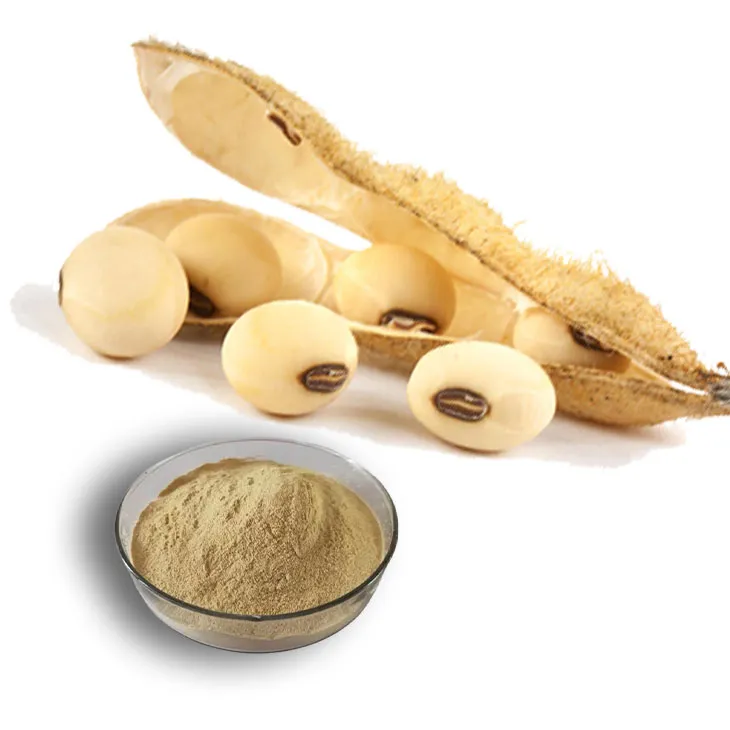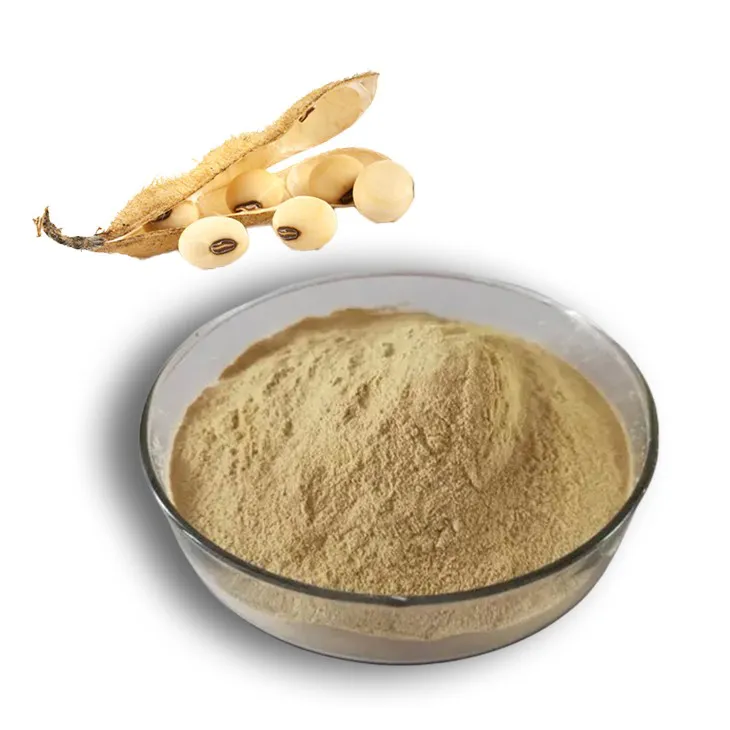- 0086-571-85302990
- sales@greenskybio.com
Is soy extract beneficial for diabetes? Are these all safe and suitable for diabetic patients?
2024-11-11

1. Introduction
Diabetes is a chronic metabolic disorder that affects millions of people worldwide. Management of diabetes often involves lifestyle modifications, including diet. Soybean extract has been the subject of much research in relation to its potential benefits for various health conditions, including diabetes. In this article, we will explore whether soybean extract is beneficial for diabetes patients and examine its safety considerations.

2. Composition of Soybean Extract
Soybean extract contains a variety of bioactive compounds. Isoflavones are one of the most notable components. These are phytoestrogens that have structural similarities to estrogen hormones in the human body. Genistein and daidzein are the two main isoflavones present in soybean extract. Additionally, soybean extract also contains proteins, fiber, and other micronutrients such as vitamins and minerals.

3. Potential Benefits for Diabetes
3.1 Blood Glucose Regulation
Some studies suggest that soybean extract may play a role in regulating blood glucose levels. The isoflavones in soybean extract may improve insulin sensitivity. Insulin sensitivity refers to how effectively cells in the body respond to insulin. By enhancing insulin sensitivity, the body may be able to better regulate blood sugar levels. In animal studies, soybean isoflavones have been shown to reduce fasting blood glucose levels. However, more research in humans is needed to fully confirm these effects.
3.2 Lipid Profile Improvement
Diabetes is often associated with abnormal lipid profiles, such as high levels of triglycerides and low - density lipoprotein (LDL) cholesterol. Soybean extract may have a positive impact on lipid metabolism. The fiber in soybean extract can help lower cholesterol levels by binding to bile acids in the intestine and promoting their excretion. Isoflavones may also affect lipid metabolism at the cellular level, potentially reducing the risk of cardiovascular complications in diabetes patients.
3.3 Anti - Inflammatory Effects
Chronic inflammation is a characteristic feature of diabetes. Soybean extract has been shown to possess anti - inflammatory properties. The isoflavones can modulate the activity of inflammatory cytokines, reducing the overall inflammatory state in the body. By reducing inflammation, it may help in better management of diabetes and potentially prevent some of the long - term complications associated with the disease.

4. Safety Considerations
4.1 Allergic Reactions
Some individuals may be allergic to soy products. Soy allergy can range from mild symptoms such as hives and itching to more severe reactions like anaphylaxis. Before using soybean extract, individuals with a known soy allergy should avoid it. Even those without a known allergy history should be cautious and monitor for any signs of allergic reactions when starting to use soybean extract.
4.2 Hormonal Effects
The isoflavones in soybean extract are phytoestrogens. There has been some concern about their potential hormonal effects, especially in individuals with hormone - sensitive cancers or certain hormonal disorders. However, current research has not provided conclusive evidence that normal consumption of soybean extract poses a significant risk in these populations. Still, it is advisable for individuals with such conditions to consult their healthcare providers before using soybean extract.
4.3 Drug Interactions
Soybean extract may interact with certain medications. For example, it could potentially interfere with the absorption or effectiveness of some thyroid medications. If a diabetic patient is taking other medications, it is crucial to consult a doctor or pharmacist to determine whether soybean extract may interact with their current medications.
5. Is it Safe for All Diabetic Patients?
The safety of soybean extract for diabetic patients is not universal. While many diabetic patients may benefit from the potential advantages of soybean extract, certain subgroups need to be more cautious. Pregnant and lactating women with diabetes should be especially careful. The hormonal effects of isoflavones and the potential impact on the fetus or infant are not fully understood. Elderly diabetic patients may also have different physiological responses to soybean extract, and their overall health status and concurrent medications need to be considered. Additionally, diabetic patients with pre - existing kidney or liver problems may need to be monitored more closely if they choose to use soybean extract, as these organs are involved in the metabolism and excretion of its components.
6. Conclusion
Soybean extract shows potential benefits for diabetes patients in terms of blood glucose regulation, lipid profile improvement, and anti - inflammatory effects. However, safety considerations cannot be overlooked. Allergic reactions, hormonal effects, and drug interactions are important factors to take into account. It is not safe for all diabetic patients, and individual circumstances such as pregnancy, age, and pre - existing health conditions need to be considered. Therefore, diabetic patients who are interested in using soybean extract should consult their healthcare providers first to ensure its safety and effectiveness in their specific case.
FAQ:
Question 1: What are the potential benefits of Soy Extract for diabetes?
Soy Extract may offer several benefits for diabetes. It contains components like isoflavones which may help in improving insulin sensitivity. This means the body can use insulin more effectively to regulate blood sugar levels. Additionally, soy proteins can contribute to better glycemic control by slowing down the digestion and absorption of carbohydrates, which in turn helps prevent rapid spikes in blood glucose.
Question 2: How does Soy Extract affect blood sugar levels?
The components in soy extract can influence blood sugar levels in multiple ways. As mentioned before, the isoflavones and soy proteins play important roles. Isoflavones may enhance the function of pancreatic beta - cells that produce insulin. Soy proteins' effect on carbohydrate metabolism helps in maintaining a more stable blood sugar level throughout the day, rather than having large fluctuations.
Question 3: Are there any side effects of soy extract for diabetic patients?
For most diabetic patients, soy extract is generally well - tolerated. However, some people may experience allergic reactions if they are allergic to soy. Also, in very rare cases, excessive consumption of soy products containing the extract may lead to digestive issues such as bloating, gas, or diarrhea. But these are not common and are usually related to overconsumption.
Question 4: Can all diabetic patients use soy extract?
Not all diabetic patients can use soy extract without caution. Those with soy allergies should avoid it completely. Additionally, diabetic patients who are taking certain medications, such as blood thinners or medications that interact with estrogen - like substances (since isoflavones have estrogen - like properties), should consult their healthcare provider before using soy extract to ensure there are no adverse interactions.
Question 5: How much soy extract is safe for diabetic patients?
There is no one - size - fits - all answer to how much soy extract is safe for diabetic patients. It depends on various factors such as the individual's overall health, diet, and any existing medical conditions. Generally, moderate consumption as part of a balanced diet is considered safe. However, it is always best to consult a healthcare professional or a registered dietitian who can provide personalized advice based on the specific situation of the patient.
Related literature
- The Role of Soy in Diabetes Management"
- "Soy Extract and Blood Glucose Regulation: A Review"
- "Safety and Efficacy of Soy - Based Products in Diabetic Populations"
- ▶ Hesperidin
- ▶ Citrus Bioflavonoids
- ▶ Plant Extract
- ▶ lycopene
- ▶ Diosmin
- ▶ Grape seed extract
- ▶ Sea buckthorn Juice Powder
- ▶ Fruit Juice Powder
- ▶ Hops Extract
- ▶ Artichoke Extract
- ▶ Mushroom extract
- ▶ Astaxanthin
- ▶ Green Tea Extract
- ▶ Curcumin
- ▶ Horse Chestnut Extract
- ▶ Other Product
- ▶ Boswellia Serrata Extract
- ▶ Resveratrol
- ▶ Marigold Extract
- ▶ Grape Leaf Extract
- ▶ New Product
- ▶ Aminolevulinic acid
- ▶ Cranberry Extract
- ▶ Red Yeast Rice
- ▶ Red Wine Extract
-
Ivy Extract
2024-11-11
-
Eucommia Ulmoides Extract
2024-11-11
-
Cassia Seed Extract
2024-11-11
-
Mulberry Extract
2024-11-11
-
Alfalfa Meal
2024-11-11
-
Bitter Melon Extract
2024-11-11
-
Sea buckthorn oil
2024-11-11
-
Astaxanthin
2024-11-11
-
Polygonum multiflorum extract
2024-11-11
-
Grape Seed Extract
2024-11-11





















